Progressive Coaches (Cambridge)
1935
AEC Regent 1
London Transport (Chiswick) H26/30R
I am coming to the end of my boyhood ex-London Transport (photographed) sightings now. I proffer this shot of ex-London Transports STL 2117 during the building of Stevenage New Town, when Mowlem Construction hired their workers’ transport from Progressive Motor Coaches of Cambridge. STL 2117 was seen in the company of STL 971 on April 8th 1958, awaiting its next muddy-booted cargo.
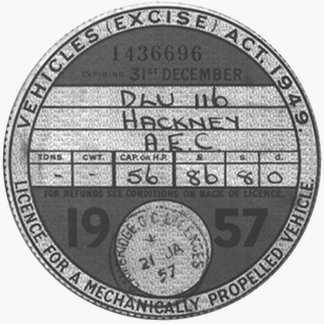
I also managed to get an old tax disc from STL 2117 for 1957 showing a yearly charge of 86 pounds 8 shillings.
Photographs and Copy contributed by Victor Brumby
12/01/12 – 05:43
As a kid, I always thought works buses looked drab and neglected. In retrospect, knowing how many fine vehicles were scrapped at the end of their PSV lives, I suppose this did extend their lives. How many subsequently survived into preservation, though?
David Oldfield
12/01/12 – 05:44
Not to mention those who survived as showmen’s vehicles in many guises and often ingeniously (sometimes very professionally) modified. It was more interesting for me to look at these than partake of the amusements/rides – how sad is that? At least these vehicles survived longer than worn-out, hard-worked, often-abused works buses.
Chris Hebbron
12/01/12 – 17:10
Progressive Motor Coaches was formed in 1934 by Albert Edward “Paddy” Harris who had previously worked for Lord Astor Coaches (which, despite its high sounding title, was run by a family named Brown). The Progressive livery was pale green and white. As Victor’s picture shows, this operator had two STLs, Nos. 971 with Chiswick H29/19F body (ex Country area) and 2117 with a later Chiswick H30/26R body (like the others in this batch, its original metal framed Park Royal body had proved to be a disaster). These two were bought in 1955, and were kept until at least 1958. Progressive also had a total of five so called “pre war” RTs (in fact, all except RT 1 entered LPTB service between 1940 and 1942). These were RTs 32/40/76/84/139 FXT207/215/251/259/314, all of which were bought between January and April 1956. RT 32 was sold on almost immediately, RTs 76 & 84 lasted beyond 1958, and RTs 40 and 139 were disposed of in 1959. I owe much of this information to Ian’s Bus Stop website, and to Paul Carter’s detailed books on Cambridge in the Prestige Series.
Roger Cox
12/01/12 – 17:18
Thanks for the information Roger guess what was on the same scan of the DLU 116 tax disc.
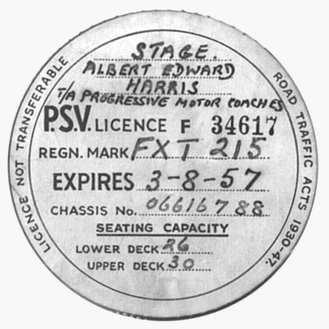
There is also BLH 828 if anyone knows more on that Regent 06613259 I will post it.
Peter
13/01/12 – 07:30
According to Ians Bus Stop, BLH 828 was STL971, mentioned above.
Bob Gell
13/01/12 – 07:31
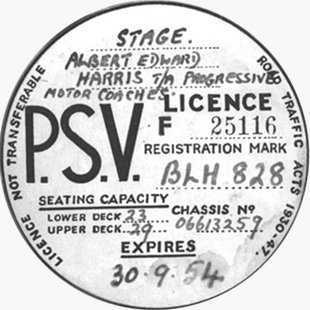
Peter, BLH 828 was the registration of STL 971. This was one of the Country Area green STLs which had a Chiswick built body of the peculiar front entrance design which seated only 48 passengers, 29 upstairs and 19 downstairs. This design had no entrance door, it being supposed that the angled front bulkhead would prevent draughts from entering the saloon. Of course this theory was preposterous, and these buses were notoriously cold to travel in. (I can confirm this from my own childhood recollections of these things on the Chelsham operated routes across Croydon.) Progressive upseated BLH 828 to 52 by adding four seats downstairs over the wheel arches.
Roger Cox
13/01/12 – 09:14
Roger Cox beat me to it with details from Paul Carter’s excellent books so I will just add that my memories of International Progressive Coaches (as they became) are from the 1960s when their modern coaches (half a dozen brand new every year) passed my home. Sadly it all went pear shaped in the early 1970s and by 1974 the business was finished.
Nigel Turner
13/01/12 – 13:38
Nigel you say “International Progressive Coaches (as they became)” do you know when the name changed, I do have a good reason for asking.
Peter
13/01/12 – 14:24
Unfortunately Paul Carter’s book doesn’t say exactly when the name changed but it implies that it was between 1964 and 1969. However it seems that at least some of the coaches kept the old fleet name after this time. Continental trips had started soon after WWII.
Nigel Turner
13/01/12 – 15:34
Thanks for that Nigel that is near enough for me, you will see my reason for the question Friday 03/02.
Peter
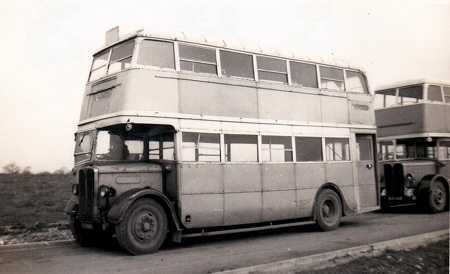 Vehicle reminder shot for this posting
Vehicle reminder shot for this posting
11/11/16 – 06:34
I have every registration mark of the fleet from day one.
Liam Harris
Paddy Harris’s Son
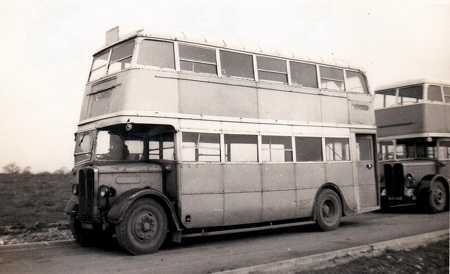
Leave a Reply